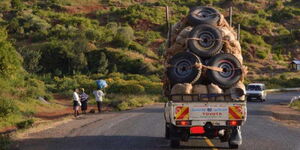Residents of Kisumu County fell back on an ancient cultural practice on the night of Friday, April 3, in a bid to push back evil spirits believed to be behind the Covid-19 outbreak in Kenya.
The practice taken up by the people of Obunga, Kajulu, Mambolea and Bandani areas was characterised by the hitting of different metallic objects to fight these perceived spirits.
A report by the Daily Nation on Monday, April 6, details that the Friday ritual was reminiscent of what had occurred following the outbreak of smallpox.
According to Odungi Randa, a Luo elder, the Luo community had treated the outbreak as satanic and hit metal objects to drive the spirits back to Lake Victoria.
The age-old ritual of hitting metal objects is believed to exorcise evil spirits known as nyawawa. These are believed to be spirits of those who had died in Lake Victoria.
There is a long-held belief that when nyawawa frequent an area, they can only be driven away through this ritual.
The failure to expel the spirits, according to local belief, could attract various calamities including pandemics or even death.
Odungi detailed the practice explaining that before the modern treatment for smallpox was created, the ritual was strictly enforced.
The elder, however, noted that the same could not be replicated for Covid-19.
"When I heard my neighbours scare away nyawawa on Friday night, I remembered how we used to drive away smallpox, but this is not the same for coronavirus. We have to follow what the government is telling us and maintain a high level of hygiene to beat it," stated Randa.
The Covid-19 virus has brought into question cultural and religious practices that could possibly advance the spread of the pandemic.
A report from African Arguments published on March 23, 2020, questioned whether the culture of eating wild animals in Central Africa could be a contributing factor to the spread of zoonotic outbreaks such as Covid-19.
The author posits that this is a result of the ties that bushmeat and its consumption has on the social and cultural needs of the people.
Similarly, a report by the Japan Times questioned whether Japanese culture was contributing to the low spread of the virus among the people.
Japanese culture has a long history of wearing masks as well as limited skin-to-skin contact between individuals.
Experts have however warned against creating a link between culture and the spread of pandemics as this could ostracise communities or alternatively create complacency.












